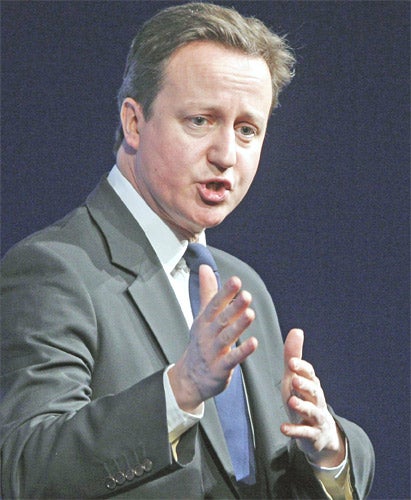Poll of polls shows cuts denting PM's 'Teflon' image

Your support helps us to tell the story
From reproductive rights to climate change to Big Tech, The Independent is on the ground when the story is developing. Whether it's investigating the financials of Elon Musk's pro-Trump PAC or producing our latest documentary, 'The A Word', which shines a light on the American women fighting for reproductive rights, we know how important it is to parse out the facts from the messaging.
At such a critical moment in US history, we need reporters on the ground. Your donation allows us to keep sending journalists to speak to both sides of the story.
The Independent is trusted by Americans across the entire political spectrum. And unlike many other quality news outlets, we choose not to lock Americans out of our reporting and analysis with paywalls. We believe quality journalism should be available to everyone, paid for by those who can afford it.
Your support makes all the difference.David Cameron's honeymoon with the voters has ended and he is no longer "Teflon man" as public spending cuts start to bite, according to The Independent's latest "poll of polls".
Until now, Mr Cameron's personal popularity has remained buoyant despite a gradual drop in support for the Conservative Party. This raised hopes among Tory strategists that he would float above party politics – even though Nick Clegg has seen his personal ratings nosedive along with his party's since last year's general election. Some Liberal Democrats even feared that their leader would become Mr Cameron's "human shield".
The monthly poll of polls for January shows more people are now unhappy than happy with Mr Cameron's performance. One survey even showed him as unpopular as Margaret Thatcher was in January 1980, at the equivalent stage of her first term.
"This is the first time since last year's election that Mr Cameron's net ratings have consistently been negative and suggests that the Prime Minister's honeymoon appears to be over," said John Curtice, professor of politics at Strathclyde University, who compiled the poll of polls. "The hard graft of trying to take the public with him through difficult times has now begun. Mr Cameron has lost his shine and doubts are creeping in about the Government's handling of the economy."
Professor Curtice's weighted average of the surveys taken by ComRes, ICM, Ipsos MORI and YouGov last month puts Labour on 42 per cent (up two points on December), the Tories on 35 per cent (down three), Liberal Democrats on 12 (up one point) and other parties on 11 per cent (no change).
While the Tories have slipped below their 36 per cent share at last year's election for the first time, the drop in Liberal Democrat support appears to have bottomed out.
If repeated at a general election fought under the first-past-the-post system, the latest figures would give Labour an overall majority of 82.
However, the analysis suggests that Labour could be a long way from achieving such a result. According to Professor Curtice, Labour Leader Ed Miliband is still struggling to make a favourable impression with the public.
And Labour has not made any significant progress in persuading the public it could do a better job on the crucial issue of the economy. The Tories are still ahead when people are asked which party is likely to run the economy well. Although the number of people who blame the spending cuts on the Government has reached its highest level (26 per cent) since the election, more people (40 per cent) blame Labour. This suggests that Mr Miliband has failed in his attempt to convince people that the financial crisis was caused mainly because of the global economic crisis.
Professor Curtice said: "It seems that to discontent and disappointment about the role played by the Liberal Democrats in the Coalition is now being added doubts about the competence of the Conservatives. Yet while Labour has forged ahead, its recovery appears to be based on disillusion with the Conservatives rather than any renewal of faith in the party itself."
Join our commenting forum
Join thought-provoking conversations, follow other Independent readers and see their replies
Comments